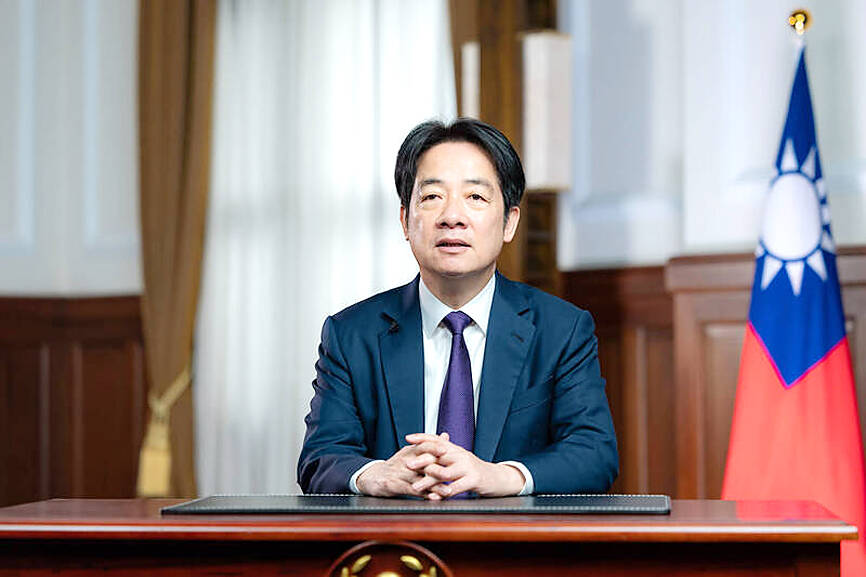Taiwan is to rapidly expand procurement of US goods and arms and remove barriers to free trade, President William Lai (賴清德) wrote in a Bloomberg opinion piece published yesterday, in response to US President Donald Trump’s massive tariffs measures that have roiled global markets.
In an article titled “Taiwan has a roadmap for deeper US trade ties,” Lai laid out four core principles that are to guide the nation’s response to Trump’s tariffs.
Hours after the “reciprocal” tariffs went into effect on Wednesday last week, Trump said he was authorizing a 90-day pause, but would maintain a baseline universal tariff of 10 percent for most countries, effective immediately.

Photo courtesy of the Presidential Office
The exception was China, he said, announcing a 125 percent tariff on that country.
Lai said that like other nations, Taiwan would engage in trade negotiations with the US about tariffs.
“While Taiwan already maintains low tariffs, with an average nominal rate of 6 percent, we are willing to further cut this rate to zero on the basis of reciprocity with the US,” he wrote. “By removing the last vestiges to free and fair trade, we seek to encourage greater trade and investment flows between our two economies.”
Taiwan would also try to narrow the trade imbalance by “rapidly” procuring energy, agriculture and other industrial goods from the US, the president wrote.
Moreover, Taiwan would pursue additional arms procurement, which is vital in defending against Chinese threats, he said, adding that those purchases are not reflected in trade balances.
Third, Taiwan would establish a cross-agency called the “US Investment Team” to facilitate more investments in the US, he wrote.
Taiwanese firms in the US, including Taiwan Semiconductor Manufacturing Co, currently support 400,000 jobs. he wrote.
Fourth is Taiwan’s commitment to removing barriers to free trade, Lai said, adding that his administration would address US concerns about “export controls and improper transshipment of low-cost goods through Taiwan.”
“These steps form the basis of a comprehensive roadmap for how Taipei would navigate the shifting trade landscape, transforming challenges in the Taiwan-US economic relationship into new opportunities for growth, resilience and strategic alignment,” Lai wrote.
“At a time of heightened global uncertainty, underpinned by growing Chinese assertiveness, closer trade ties are more than sound economics; they are a critical pillar of regional security,” he wrote.

Chinese spouse and influencer Guan Guan’s (關關) residency permit has been revoked for repeatedly posting pro-China videos that threaten national security, the National Immigration Agency confirmed today. Guan Guan has said many controversial statements in her videos posted to Douyin (抖音), including “the red flag will soon be painted all over Taiwan” and “Taiwan is an inseparable part of China,” and expressing hope for expedited reunification. The agency last year received multiple reports alleging that Guan Guan had advocated for armed reunification. After verifying the reports, the agency last month issued a notice requiring her to appear and explain her actions. Guan

GIVE AND TAKE: Blood demand continues to rise each year, while fewer young donors are available due to the nation’s falling birthrate, a doctor said Blood donors can redeem points earned from donations to obtain limited edition Formosan black bear travel mugs, the Kaohsiung Blood Center said yesterday, as it announced a goal of stocking 20,000 units of blood prior to the Lunar New Year. The last month of the lunar year is National Blood Donation Month, when local centers seek to stockpile blood for use during the Lunar New Year holiday. The blood demand in southern Taiwan — including Tainan and Kaohsiung, as well as Chiayi, Pingtung, Penghu and Taitung counties — is about 2,000 units per day, the center said. The donation campaign aims to boost

The Kaohsiung Tourism Bureau audited six hotels in an effort to prevent price gouging ahead of Korean band BTS’ concert tour in the city scheduled for Nov. 19, 21 and 22 this year. The bureau on Friday said that the audits — conducted in response to allegations of unfair pricing posted on social media — found no wrongdoing. These establishments included the local branches of Chateau de Chine, Hotel Nikko, My Humble House, and Grand Hai Lai, it said, adding that the Consumer Protection Commission would have penalized price gougers had the accusations been substantiated. The bureau said the Tourism Development Act

BACK TO WINTER: A strong continental cold air mass would move south on Tuesday next week, bringing colder temperatures to northern and central Taiwan A tropical depression east of the Philippines could soon be upgraded to be the first tropical storm of this year, the Central Weather Administration (CWA) said yesterday, adding that the next cold air mass is forecast to arrive on Monday next week. CWA forecaster Cheng Jie-ren (鄭傑仁) said the first tropical depression of this year is over waters east of the Philippines, about 1,867km southeast of Oluanpi (鵝鑾鼻), and could strengthen into Tropical Storm Nokaen by early today. The system is moving slowly from northwest to north, and is expected to remain east of the Philippines with little chance of affecting Taiwan,